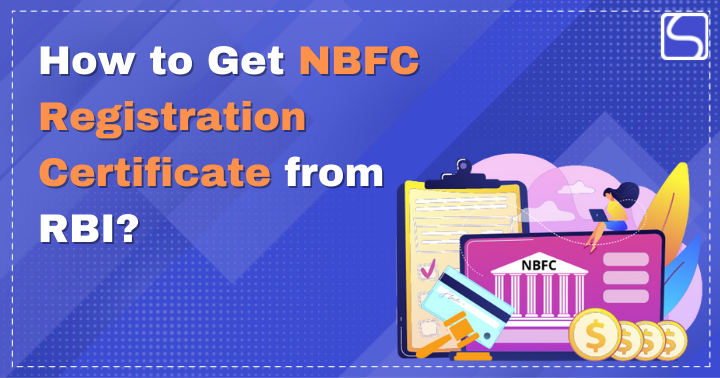How to Get NBFC Registration Certificate from RBI?

Astitva Kumar | Updated: Jan 05, 2023 | Category: NBFC
The banking sector encompasses various financial operations such as deposits, loans, and so on. Most countries have a centralized bank that regulates all other banks in the country. The Non-Banking Financial Company sector in India has enormous growth potential. These organizations are vital to the economy, so the government and its authorities pay close attention to their operations. The credit gap in India is particularly severe for MSMEs and the largest socioeconomic group at the bottom of the pyramid. In this article, we will discuss NBFC Registration Certificate.
A Non-Banking Financial Company (NBFC) is defined by the Reserve Bank of India (RBI) as “A company registered under the Companies Act, 1956 engaged in the business of loans & advances, acquisition of shares/bonds/stocks/securities/debentures issued by Government/local authority/other marketable securities of a like kind, leasing, hire-purchase, insurance business, chit business but does not include any institution whose major business is banking.”
Simply defined, a Non-Banking Financial Company (NBFC) takes money in lump sums or instalments linked to a programme and manages its financial process. Individuals may come across a range of NBFCs in their daily lives that engage in various financial operations.
Table of Contents
What is NBFC?
A company certified under the Companies Act of 1956 as a non-banking financial company (NBFC) is one that engages in a variety of businesses, such as loans and advances, the purchase of shares, stocks, bonds, debentures, securities, or any other type of marketable security of the same nature issued by the Government of India or any local authority, insurance business, leasing, chit fund business, hire or/and purchase, but it excludes institutions whose primary business is that of lending money. The receipt of deposits under any such scheme, arrangement, or manner, whether in lump sum form, in instalments via contributions, or in any other manner, is the principal business of a non-banking financial institution.
Types of NBFCs
- Deposit Accepting NBFC (Type -1)
- Non-Deposit accepting NBFC (Type -2)
A non-deposit accepting NBFCs in India can be further categorised into ten types, as follows:
- Asset Finance Company, also called as AFC
- Loan Company, also called as LC
- Infrastructure Finance Company, also called as IFC
- Investment Company, also called as IC
- Infrastructure Debt Fund: Non- Banking Financial Company also called as IDF-NBFC
- Systemically Important Core Investment Company, also called as CIC-ND-SI
- Non-Banking Financial Company-Micro Finance Institution, also called as NBFC-MFI
- Non-Banking Financial Company – Factors also called as NBFC-Factors
- Mortgage Guarantee Companies, also called as MGC
- Non-Operative Financial Holding Company, also called as NOFHC
Eligibility Criteria for NBFC Registration Certificate
All Non-banking financial companies must register with the Reserve Bank of India (RBI) (except the ones mentioned above in the table). Before you proceed with the process of NBFC registration, kindly check the following eligibility criteria for the NBFC Registration Certificate:
The company must be registered as a private or public limited company under the Company Act of 2013 or the Company Act of 1956.
- They must have their business financial strategy for at least five years
- A company must have a good credit score or the CIBIL score
- A company must own funds of a minimum of INR 2 crore or above
- A company must have minimum assets worth INR 200 crore or above
- A company must comply with the provisions of the FEMA.
Documents required for NBFC registration Certificate
The following documents must be provided to obtain an NBFC Registration Certificate:
- Management-related information
- In the case of public limited corporations, certified copies of the Certificate of Incorporation and the Certificate of Commencement of Business.
- Certified copies of the company’s most recent Memorandum and Articles of Association. Details of financial business clauses in the MoU.
- A copy of the company’s PAN/CIN.
- Each director must fill up and sign their director profile.
- A certificate from the NBFC/s where the Directors received NBFC experience.
- CIBIL information about the company’s directors
- Board Resolution stating that the company has not accepted any public deposits in the past (specify period)/does not hold any public deposits as of the date and will not accept any public deposits in the future without the prior written consent of the Reserve Bank of India.
- An authenticated copy of the board resolution establishing the “Fair Practices Code.”
- Statutory Auditors Certificate attesting to the fact that the company accepts/does not accept/does not hold Public Deposit.
- Statutory Auditors Certificate attesting that the company is not engaged in NBFC activity.
- Statutory Auditors Certificate attesting to the net owned fund as of the application date.
- Details of the company’s authorised share capital and the most recent shareholding pattern, including percentages.
- A copy of the Fixed Deposit receipt and a bankers certificate of no lien indicating the balances in support of the Net Owned Funds.
- Details of bank balances/accounts/full postal address of the branch/bank, loan/credit facilities, and so on.
- The three years prior Directors’ and auditors’ reports, an audited balance sheet and profit and loss account, or for the smallest time frame possible (for companies already in existence).
- Business plan for the next three years detailing the company’s (a) business drive, (b) market sector, and (c) anticipated balance sheets, cash flow statement, and asset/income pattern statement, without any element of public deposits.
- Documentary documentation supporting the source of the company’s initial cash.
- Self-attestation of bank statements/IT returns, etc.
Procedure to get NBFC Registration Certificate
Following is the step-by-step procedure for obtaining NBFC Registration Certificate:
Step 1 of the process includes registering the company under the Companies Act 2013
Step 2 of the process asks the company to maintain anet owned fund of at least INR 2 crore.
Step 3 of the process says there should be at least one director in the company from the same background.
Step 4 of the process says company must have a good credit score or the CIBIL score
Step 5, after this applicant, can fill out the application form with all the documents and submit it.
Step 6, after the application has been submitted, a CARN number will be generated and will be given to the applicant for future reference.
Step 7, finally after the application is checked and verified by the authority, they wilt the licence to the company.
RBI AND NBFC
In India, RBI governs NBFCs.Non-banking financial companies are regulated by Section 45-I(a) of the RBI Act[1].
A company formed under the Companies Act of 1956 that seeks to launch a venture as a non-banking financial institution, as defined under Section 45 I(a) of the RBI Act of 1934, must meet the basic requirements that are listed below:
- According to Section 3 of the Companies Act of 1956, the company is required to be registered.
- The company should have a Net owned fund of at least INR 2 crore.(The minimum Net Owned Fund (NOF) necessary for particularly designed NBFCs such as CICs, NBFC-Factors, and NBFC-MFIs is specified individually.)
(NOTE: However, there are certain categories of Non-banking financial companies which are regulated by other regulatory bodies in India. These NBFCs are exempted from the requirement of registering with RBI. The list is as follows: Venture Capital Fund or the Merchant Banking companies or Stock broking companies are registered with SEBI, Insurance Companies holding a valid Certificate of Registration (CoR) issued by IRDA, Nidhi companies as notified under Section 620A of the Companies Act of 2013, Chit companies as defined in clause (b) of Section 2 of the Chit Funds Act of 1982, Housing Finance Companies regulated & controlled by National Housing Bank, Stock Exchange or a Mutual Benefit company.)
To simplify this, here is the table for the above explanation:
| Type of the company | Regulatory body |
| Chit Funds | State Government |
| Venture Capital Fund | Securities and Exchange Board of India (SEBI) |
| Stock Brokering | Securities and Exchange Board of India (SEBI) |
| Merchant Banking | Securities and Exchange Board of India (SEBI) |
| Housing Finance | National Housing Bank (NHB) |
| Nidhi Company | Ministry of Corporate Affairs |
Conclusion
Non-banking financial enterprises have emerged as rapidly emerging types of financial companies. They have proven to be an essential component of the Indian financial system. A diverse range of institutions (other than commercial and cooperative banks) engage in commercial arbitration in various ways, such as accepting deposits, hiring, leasing, providing loans and advances, and so on. They raise funds directly or indirectly from the general public and then lend it. They provide loans to a wide range of small businesses, wholesale and retail enterprises, and self-employed individuals. As a result, they have broadened and expanded the scope of financial goods and services available. Because of their simplified procedures, customer-oriented services, adaptability, timeliness in serving the credit demands of specific sectors, attractive rates of return on deposits, and so on, they are gradually becoming recognized as supplementary to the banking industry.
Read our Article:Functions performed by DSA of NBFC















